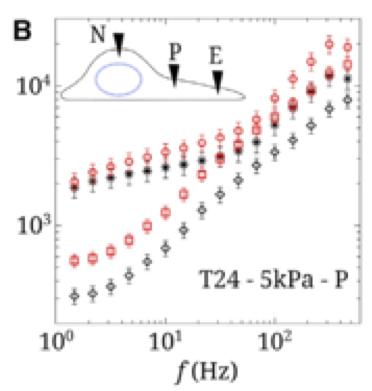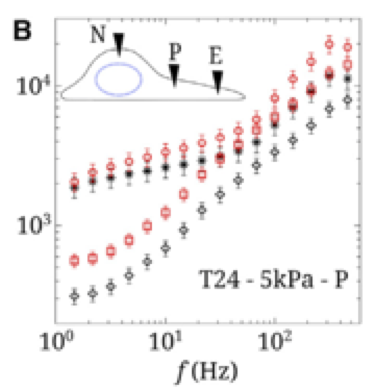Nanorheology of soft biological systems using AFM
Mapping the elastic and visco-elastic properties of biological cells at the sub-micro scale is an important challenge for medical applications. A soft matter research project at the Laboratory of interdisciplinary Physics
Description of the internship
Measuring non-ambiguously the mechanical properties of thin soft layer at the nano-scale, is an open scientific question. The objective of this research is to analyze the rheology of soft gels for biological applications. Gels forming thin layers will be analyzed using Atomic Force Microscopy (AFM). Predictions of the relationship between force and reduced indentation will be tested, using spherical indenters or pyramids and previous modeling [1]. The student will perform AFM experiments covering all conditions, i.e. various gels, different thicknesses, different indenters and will test the model, in particular a simplified relationship is needed in order to describe results in force modulation mode.
Next, applications to real cells will be considered, since their mechanical properties have been shown to be essential [2], depending on substrate thickness, cell type, as well as the locus of measurement (N, P or E, see illustration).
Qualification of the student
Skills in AFM and soft matter/biological systems are welcome.
This two- years research project is well adapted to students following the Soft Matter and Biophysics major of the master Nanosciences Nanotechnologies, or a master in Machanics.
[1] Y. Abidine, V.M. Laurent, R. Michel, A. Duperray, L.I. Palade, C. Verdier, Physical properties of polyacrylamide gels probed by AFM and rheology, Europhys. Letters, 109, 38003 (2015)
[2] Y. Abidine, A. Constantinescu, V.M. Laurent, V. Sundar Rajan, R. Michel, V. Laplaud, A. Duperray, C. Verdier, Mechanosensitivity of cancer cells in contact with soft substrates using AFM, Biophys. J., 114, 1165-1175 (2018)
Published on February 12, 2021
Updated on September 18, 2023

